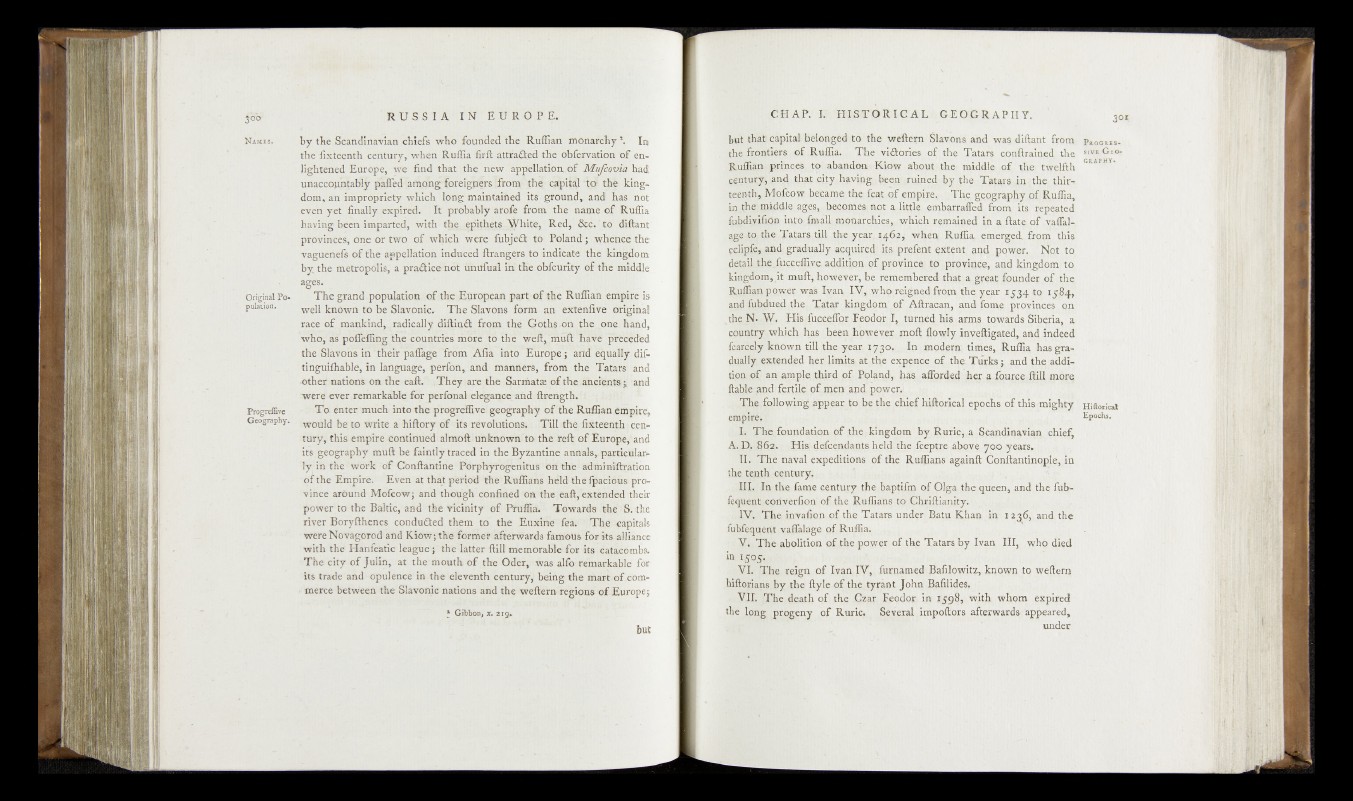
Original Po*
p ulation»
ProgrefSve
Geography*
by the Scandinavian chiefs who founded the Ruffian monarchy *. 1«
the fixtecnth century, when Ruffia fijft attracted the (Jb^eryatirin ’of Mi-
Jightened Europe, wC find that the new appellation., of Mujcovta had
unaccountably puffed^ anit^g'fQreig^frs|fioti^‘J;th4 the king,
doin, an impropriety which long maintained its^ ground, and - hats hot
even yet finally^expired. It probably arofe from the name of’ Ruffia
havibg been imparted, with the epithets White, Red, &c.'to diftant
provinces, one or two, of which'were fubjedt to Poland; whence the
vaguenefs of the appellation induced 'ftrangers to indicate the kingdom
by. the metropolis, a praöice not ünüfual in the obfcurity of the ‘èriddle
a g e s . . \
The grand population of the European part of the Ruffian empire is
well known to be Slavonic.- The Slavons form an extenfive original
race of mankind,, radically diftin£t from thq Qothj-pn the one. hand,
who, as pofleffing the countries more to the weff,'muft' ‘have preceded
the Slavons m their paffage 'from A’fia ihto"’Èuföpè ; arid equally pif-
tinguifhable, in language, perfon, and manners, from the Tatars. a,nd
other nations on. the eaft. ' .They’are the Sarmatas of the, ancients; and
werd ever,remarkable for pcrfonal elegance and ftrength. ;
To enter much into the progreffivelgeography of the Ruffian empire,
wohld bet© writea hiftory of its revolutions, TilLthe-fixtetentht^gm
tury, this empire continued almoft unknown to the fccflr of. Europe,•'»and
its geography maft be faintly traced in the Byzantine annals,. particülarr-
ly in the work o f Conftantine Porpbyrogcnitus1' on the admm’iftfation
Of the Empir«i; Evdn at that period 'the'Ruffians held1 the fpatioSs ph».
vinee around Mofcow; and though confined on the eaft, extended theix
power to the Baltic, and the vicinity o f ffuffav Towards the'S.yhc
river Boryfthene8 conduced them to the Eujrifié fea. ’ Thé tëflpitals
were Novlgtrpd and Kiow; thd' formeri;aftert§ard8 famey^foriitsMl^ce
with thé Hanil&tic lea^ei; the’latter ftill memorable fote its ^ieombs.
• The city o f Julin, at the mouth óf the Oder, was alfo reroarkable-.'far
its trade and-opulence in the eleventh century,; being the mart of ,coin-
f merce between the Slavonic nations and the weftern-regions üftEurope;;
* Gibbon, x. 219..
but
but tha® capital belonged to-the weftern Slavoria and was, diftant from
thi%#?rs-' Pf .Ruffia.. The;f5yi,£tories„ of the Tatar? conftraiijed the
Ruffian .princes( tp~ abandon Kiow sa*h$ut; the ptndcjfo »oi^ ife;1,' twelfth
century^ .and that city having, bte.n y^jned-by the Tatars .fn the thir-.
teen,th|,LlV|ofcoyK became- the, feat,ef ,erp:pi|ee ^Thc;gqqgr%)Hy of Ruffia,
bgG,omes; nqt ^ lit^l^qpjb|rr$|)b& fr.pm., its' repealed
fubdi vjfidn into finall monarches, twhich Remained ifi a, ftate of Vafial-
age totfie Tatar^.tLU the-year;.^^^ 'yvheq Ruffia.^mergecf from this;
eclipfe, and gradually acquir^dj,its,ip relent extent and _ power, bfot to
detaili.the^cceffive ’ad,d$lfen$f province, tp^grpyince, and kingdom to
kingdom,;it muff,hpne\cr; be. rememb^|,d.fbat;a,.gre?t^founder of the
Ruffianigojyer wa£ who|reigned|f|°m’th§year!r'534 tq 15^4,
and fub^u’idjS^e; Tatar kingdprn^qf jAftEa.can, and fome proyijice.s qn
ttKeN..W, Hi?Tugcgffbr Feodor I* turned his arm? towards Siberia, a
country which.hes,'^eyn),Kpw,ever. niqfi flowly .ip,veftigated,.an,4 indeed
fcarcejy.known fillitheyear, i^o^ftn modern, times,,Rufifa .hasgradually
extended her limits at.,expence .of,.the, Tufks; and the addi-
tioit.efi an anjple third of Polan,d, has, afforded ,her a fourcerifill more
liable and fertile of men and ppwer.1;^
The;foMpwmg^ppeaj;.to, be,tne chief hiftorical epochs of this^mighty
eni|a||e|
Iv The;foundation* of ;the£ kingdom by Ruric^.a.,£|candinaviqq chief.
A. Ikibtia. His, defendants hel(b'%Mfe$5?A?abqve,
II. The naval expeditions of the Rulpans againft Coriftantinqpfoin
th,f tenth qdnt-ury,
■ III. In th,e lame cgqttyjy the.baptifm qf ^Olga, the .queep^andthe fufi-
fei|neEtjCoriyerfiqnj >of the Ruffians,^ Chsiljianityi
uiO&ATheAnyafion of thfe Tatars undfer Bat.u.I^han in I2^6,,and the
fabfeqtjerit vaffalage of Ruffia.,
• V, Thevabolition of the power of, tfie Tatars by Ivan III, whg died
£
VI. The reign of Ivan IV, furnamed Bafiloyntz, known to weftern
hiftorians by the ftyle,pf the tyrant John; Bafilides, i '
\ VII. |Tbe, dgatb of the -Gzar£ .Feqdq^i in r'598, with whom expired 1
the long progeny of Ruric. Several impoftors afterwards "appeared,
under
P ro g re ssive
G eog
ra ph y .
Hiftorical
Epochs.